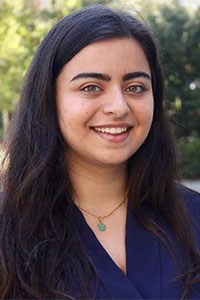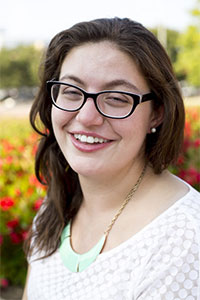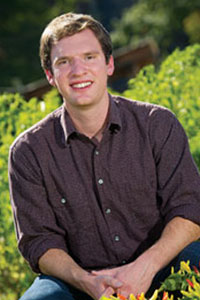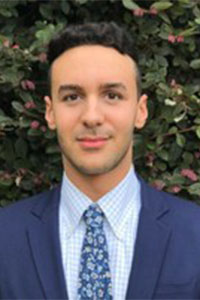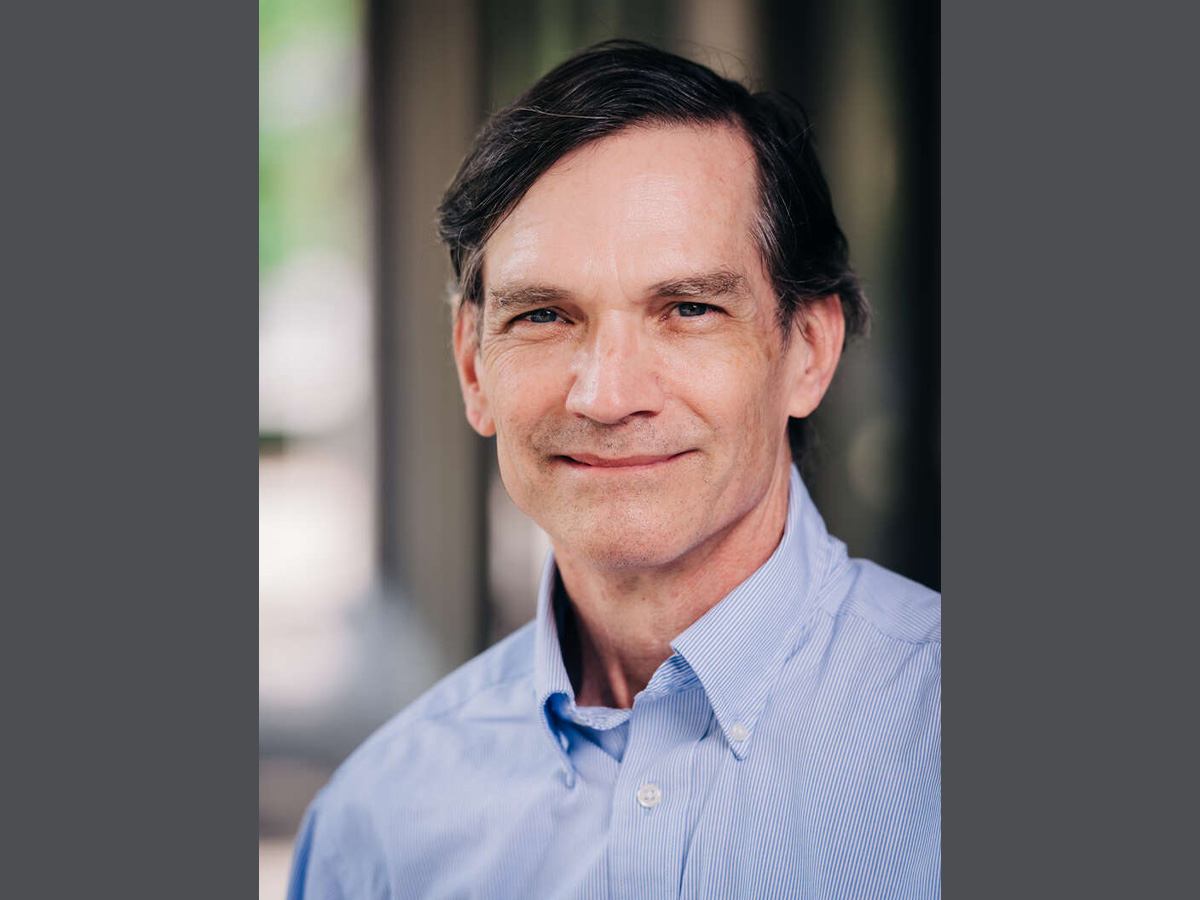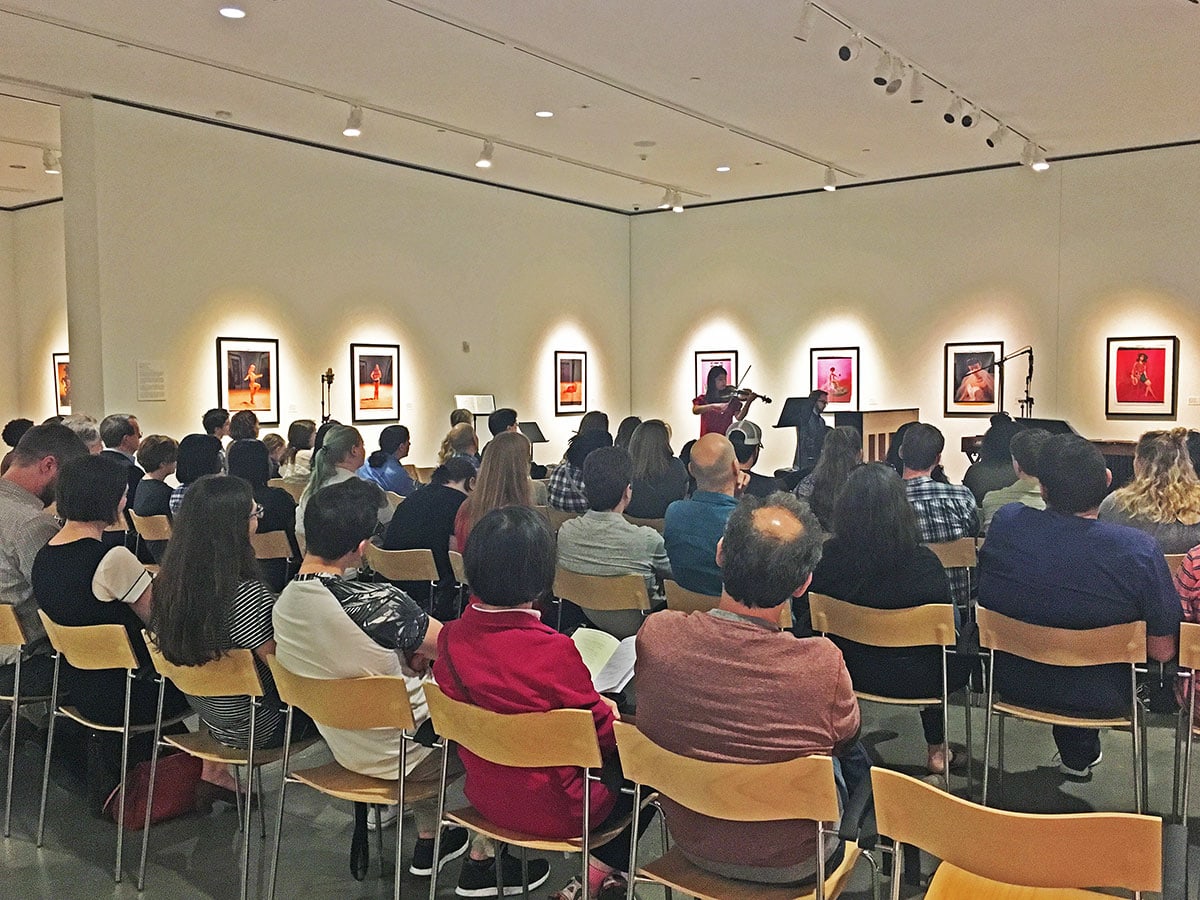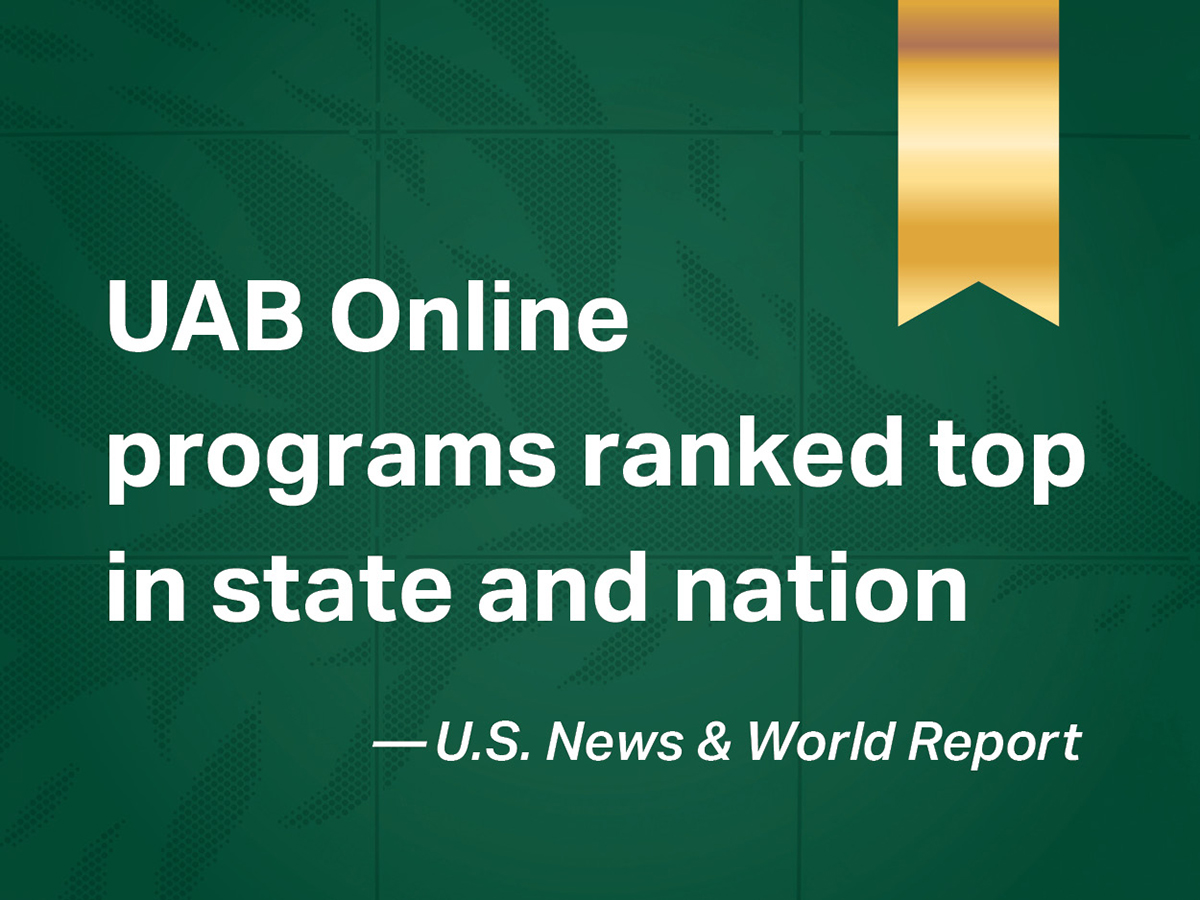The number of College of Arts and Sciences students who win major national and international scholarships and fellowships grows every year. What does it take to win one of these major prizes? And what does the achievement mean for our students as they pursue their goals?
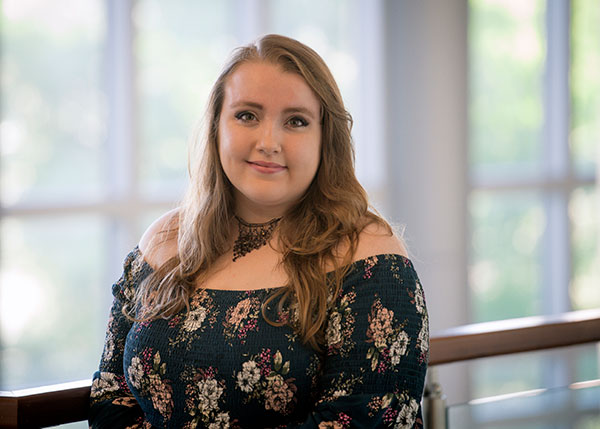 Sarah Faulkner, a 2017 graduate with bachelor’s degrees in art with a concentration in art history and sociology.
Sarah Faulkner, a 2017 graduate with bachelor’s degrees in art with a concentration in art history and sociology.
When chemistry major Gunnar Eastep fell asleep early after his last final in fall of 2017, he never dreamed that he’d wake up to a nomination for the Barry Goldwater Scholarship. “When I woke up, I saw the nomination and was pretty ecstatic about it,” he says. “All-around, it was a very surreal experience, especially since I had no clue what to expect.”
He had turned in the application about a month before he found out. “I spent a week writing terrible drafts and deleting them the next day,” he says. “I found it challenging to write a succinct and interesting personal statement without sounding overly clichéd.”
But this portion of the application wasn’t the only part that challenged Eastep. Outside of the personal statement and description of future goals, the application also requires students to write a research proposal detailing the work they’ve already accomplished as well as discussing what comes next. However, unlike most scientific journals, this proposal has to be written in the first person.
For Eastep, this portion meant detailing the research he’d pursued under Dr. Jamil Saad, assistant professor in the Department of Microbiology, who has a secondary appointment in the Department of Chemistry. Here, he’d studied the role of a particular protein in certain portions of retrovirus replication. Before last summer, his work had focused on the protein’s role in replicating the avian sarcoma virus.
Eastep says the support he received from faculty was critical to his completion of the application, and his success in winning the Goldwater. “Without Dr. Saad and the experiences I’ve had doing research in his lab, winning the Goldwater scholarship wouldn’t have been possible,” he says. “It certainly gives me a lot of confidence moving forward.
”Dr. Gray in the chemistry department has been a great help for me, too,” Eastep adds. ”He was the professor for several of my chemistry courses and wrote one of my recommendations for the scholarship. Although he didn't mentor my research, he was so helpful in giving career advice and has undoubtedly been my favorite professor.”
OPTIONS
The science-focused Goldwater Scholarship is only one of the many prestigious scholarships and fellowships that College of Arts and Sciences students can apply for. These programs range widely from scholarships for students in specific disciples to fellowships, which provide short-term learning opportunities. These experiences also vary: some support research projects at specific universities, while others are aimed at developing independent research projects on a myriad of subjects.
Sources of funding for these programs are just as diverse as the offerings themselves. Some, like the Fulbright U.S. Student Program, are sponsored by federal government agencies to bolster international relationships. Other governmental agencies fund scholarships aimed at ensuring future public servants speak languages critical to international diplomacy.
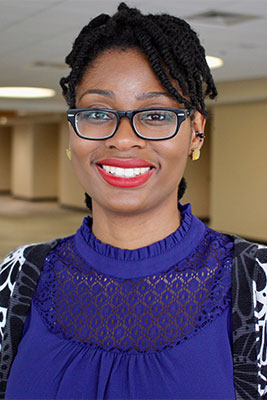
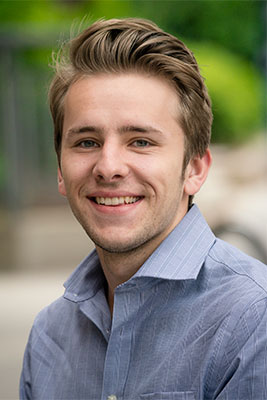

From left to right: Anthonia Carter, Gunnar Eastep, and Ayla McCay
These few programs are only the tip of the iceberg. Yet other programs are financed by private trusts to encourage traditionally marginalized groups to participate in specific fields, and others include on-campus research programs sponsored by multiple organizations from various backgrounds.
In addition to strengthening recipients’ resumes, many of these programs also connect participants with their alumni networks, adding an additional level of value with professional connections.
Depending on a student’s major and interests, one or several of these programs may be a fit. But one thing is consistent across all of these offerings: the application process is rigorous. Writing essays, securing recommendation letters, and, if necessary, preparing for interviews is time-consuming, and requires long-term hard work and focus. Although the payoff is great, there is a significant time commitment involved in getting there.
RESEARCH
Recipients of the Goldwater Scholarship like Eastep receive a set amount of money each year to put towards books, living expenses, tuition, and other fees. Although Eastep believes he would be pursuing a very similar course of study and research if he had not been chosen, he calls the scholarship a big confidence boost. “Being awarded the Goldwater scholarship has been immensely gratifying considering how long I’ve been working as a student researcher,” he says. “It’s definitely a massive boon to my career prospects, and particularly graduate applications.”
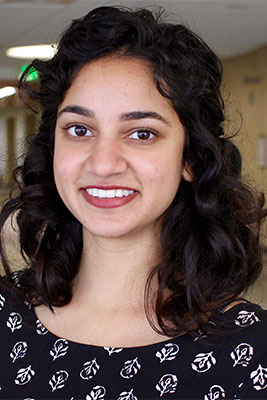 Senior neuroscience student Jasmin Revanna
Senior neuroscience student Jasmin Revanna
Other students benefit from the research opportunities afforded by fellowships rather than scholarships. One such program is the Amgen Scholars U.S. Program, which provides summer research opportunities at one of 10 universities around the country. Funded by the Amgen Foundation, this program connects participants from all over the world while also allowing them to undertake a rigorous research program under different faculty. Senior neuroscience student Jasmin Revanna attended the 2017 session at Caltech, and used her time in the fellowship to optimize a genetic editing tool to activate and deactivate targeted genes in nematodes.
Each of the Amgen schools has an individual application process. In addition to the traditional personal statements, transcripts, and letters of recommendation, Caltech also requires applicants to identify a researcher and work with them to write a research proposal for their time in the program, says Revanna. “This takes a lot of communicating back and forth, so starting early is always recommended.”
To continue her 2017 research, she applied to the 2018 WAVE Fellows Program at Caltech. This fellowship is designed to open the school’s research resources to demographics that are traditionally underrepresented in the sciences, and Revanna applied in hopes of returning to the same lab to test the system she’d built the summer before.
Though her research focus ended up being different—there, she built more than 100 tools for the public to use to study the role of specific neurotransmitters in nematodes—she feels that both experiences were extremely valuable.
“These fellowships helped me discover what I want to do after graduation, which is go to graduate school,” she says. Revanna continues that these two fellowships have given her the confidence to apply to high caliber graduate programs to further her studies. But she’s not limiting herself to only one possibility: Revanna is also currently applying for a Fulbright fellowship to do research abroad.
INTERNATIONAL/GLOBAL
The Fulbright fellowship is arguably one of the most recognizable fellowship programs in the world. They award approximately 1,900 grants annually to students and recent graduates who want to do projects to study culture or science or to teach abroad. In 2018, six UAB students received the honor. Sarah Faulkner, who graduated in 2017 with bachelor’s degrees in art with a concentration in art history and sociology, applied to the program to study the textile art of the Lepcha, a cultural group indigenous to Sikkim, India.
During her time abroad, Faulkner will research and compile a record of the Lepcha’s crafts, study the local language, and begin studying local Buddhist art. “Due to both their integration with daily life and the history associated with them, Lepcha textiles represent a vibrant, fundamental facet of Lepcha heritage,” she says. “I aim to highlight both Lepcha culture and their arts, which go hand-in-hand. I hope to also learn more about the Lepcha’s folklore, performative arts, and language, which is an essential factor of the Lepcha identity.”
Faulkner says she worked on her application every day for about four months. Though the process was rigorous, it was made easier because she had a clear idea of what she wanted to do. “Even so, I must have gone through at least three dozen drafts of my essays, which included a personal statement and a rather detailed outline of my research objectives and methods,” she says.
“You have to think in concrete terms and explain your plan and purpose unambiguously,” she continues. “The only advice I have for that is just to be well-read on the area you plan to stay in and culture you intend to study, your research, and other similar projects that could serve as guides for your own. I personally took inspiration from the work already being done by various government-sponsored institutes across India to preserve the country’s traditional arts and the methodology of the cataloging work that I had done in the past as an undergraduate.”
Another federally funded program open to about 600 students each year is the Critical Language Scholarship Program. Students who receive this scholarship undergo an eight-week language immersion in a language important to national security and economic prosperity. At the same time, students are also learning about and living in the culture they’ve studied to enhance their understanding.
For UAB Honors College Global Community Leadership program student Ayla McCay, the scholarship enabled her to study Korean as part of her goal to work in international human rights.
The application process, she says, was straightforward, but the impact the program had on her future plans was unexpected. “As a student from a low-income background, I never thought that studying abroad would be an option,” she says. “Because of CLS and the help of our fellowship office, my life is going in a direction I never thought would be possible.”
All of the students are shepherded through the application and selection process by Ashley Floyd Kuntz, Ph.D., fellowships director and assistant professor in the UAB Honors College. Dr. Kuntz says that all of the students applying for fellowships and scholarships, regardless of whether they are members of the Honors College or not, have a tremendous support system around them—one that goes all the way to the top. "We are fortunate to have the strong support of President Watts," she says. "Dr. Watts makes time each fall to meet with nominees and learn about the projects they’re proposing. He advises students to be themselves, even when facing intimidating interview panels, and he encourages students to believe in their potential to compete at the highest levels. Few university presidents take such a sincere interest in getting to know students and celebrating their successes."
POST-GRADUATE
Some of these programs support recent grads’ graduate studies. Anthonia Carter, who graduated with degrees in mathematics and art, applied for and received the Fulbright Study/Research grant to pursue a degree in multidisciplinary innovation at Northumbria University in the United Kingdom. The application process was pretty standard, she says. “I chose to pursue this because I come from a multidisciplinary background of mathematics and art. I’m passionate about giving back and teaching kids that anyone is capable of learning and giving them the confidence to learn.”
The hardest part, she continues, was opening up to write her personal statement. “The easiest thing to do is to talk about my academic background. It was harder to open up and let them see what motivates me—to tell them that I was raised by a single mom who said that if I didn’t do well, she wouldn’t pay for college.”
During her time in the program, she has learned a lot about identifying and solving organizational, systemic, and creative problems in many industries. All of this, she says, is in preparation to get her Ph.D., and to one day open a youth-focused community center.
CHANGED LIVES
For some of these students, the award has only solidified their future plans. But for a few of them, this experience has completely changed the trajectory of their lives. “My time in Korea has definitely changed my plans for the future,” McCay says. “[While] applying for CLS, I thought that Korean language and culture would only be a small part of my career going forward with international human rights. Now, I cannot see a future that does not involve going back to Korea.”
